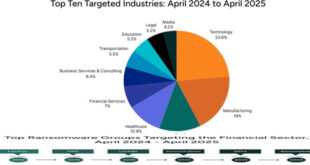According to an analyst, there will be major data breaches and fines for application developers who use generative AI (GenAI) extensively next year. Forrester made the claims in its 2024 predictions for cybersecurity, risk and privacy and trust.
Alla Valente, a senior analyst, issued a warning about the excessive use of “TuringBots”, which are GenAI assistants that aid in code creation. She emphasized the importance for developers to thoroughly scan the generated code for vulnerabilities.
By infosecbulletin
/ Friday , May 9 2025
YouTube has restricted access to at least four Bangladeshi television channels in India following a takedown request from the Indian...
Read More
By infosecbulletin
/ Friday , May 9 2025
Microsoft has fixed critical vulnerabilities in its core cloud services, including Azure Automation, Azure Storage, Azure DevOps, and Microsoft Power...
Read More
By infosecbulletin
/ Thursday , May 8 2025
The cyber threat landscape is rapidly changing, with a notable increase in ransomware activity in April 2025, driven by the...
Read More
By infosecbulletin
/ Thursday , May 8 2025
SonicWall has released patches for three security flaws in SMA 100 Secure Mobile Access appliances that could allow remote code...
Read More
By infosecbulletin
/ Thursday , May 8 2025
From April 2024 to April 2025, Flashpoint analysts noted that the financial sector was a major target for threat actors,...
Read More
By infosecbulletin
/ Thursday , May 8 2025
Cisco has issued a security advisory for a critical vulnerability in its IOS XE Software for Wireless LAN Controllers (WLCs)....
Read More
By infosecbulletin
/ Wednesday , May 7 2025
Attackers linked to the Play ransomware operation deployed a zero-day privilege escalation exploit during an attempted attack against an organization...
Read More
By infosecbulletin
/ Wednesday , May 7 2025
Hackers are exploiting an unauthenticated remote code execution vulnerability in the Samsung MagicINFO 9 Server to take control of devices...
Read More
By infosecbulletin
/ Tuesday , May 6 2025
CISA added the Langflow vulnerability, CVE-2025-3248 (CVSS score 9.8), to its Known Exploited Vulnerabilities catalog. Langflow is a popular tool...
Read More
By infosecbulletin
/ Tuesday , May 6 2025
Google has released its monthly Android security updates, addressing 46 vulnerabilities, including one that has been actively exploited. CVE-2025-27363 (CVSS...
Read More
ALSO READ:
40 countries to sign a agreement not to pay ransom
In a blog post, she mentioned that if there are no proper protections for TuringBot-generated code, Forrester predicts that by 2024, at least three data breaches will be attributed to insecure AI-generated code. These breaches could occur because of security flaws in the code or vulnerabilities in suggested AI dependencies.
Regulatory issues may arise for apps that use GenAI products like ChatGPT to provide information to users.
Valente predicted at least one would be fined for its handling of personally identifiable information (PII).
The person mentioned that OpenAI has the means to protect itself from regulators, but third-party apps on ChatGPT may not have the same resources.
Some apps introduce risks through their third-party tech providers, but lack the resources and expertise to handle them properly. In 2024, companies should identify apps that may increase their risk exposure and focus on managing third-party risks.
The European Data Protection Board has created a task force to coordinate enforcement action against ChatGPT. This action was taken after the Italian Data Protection Authority decided to suspend the use of the product in Italy.
In the US, the FTC is investigating OpenAI.
GenAI may also play a part in Valente’s third prediction: that 90% of data breaches in 2024 will feature a human element. According to Verizon, the figure is already at 74%.
GenAI poses a significant risk to security. It enhances social engineering and enables attackers to efficiently carry out convincing phishing attacks.
“This increase [in people-centric risk] will expose one of the touted silver bullets for mitigating human breaches: security awareness and training,” argued Valente.
In 2024, CISOs will focus more on adaptive human protection. This is because NIST will update its guidance on awareness and training, and there will be more human quantification vendors available.
 InfoSecBulletin Cybersecurity for mankind
InfoSecBulletin Cybersecurity for mankind















